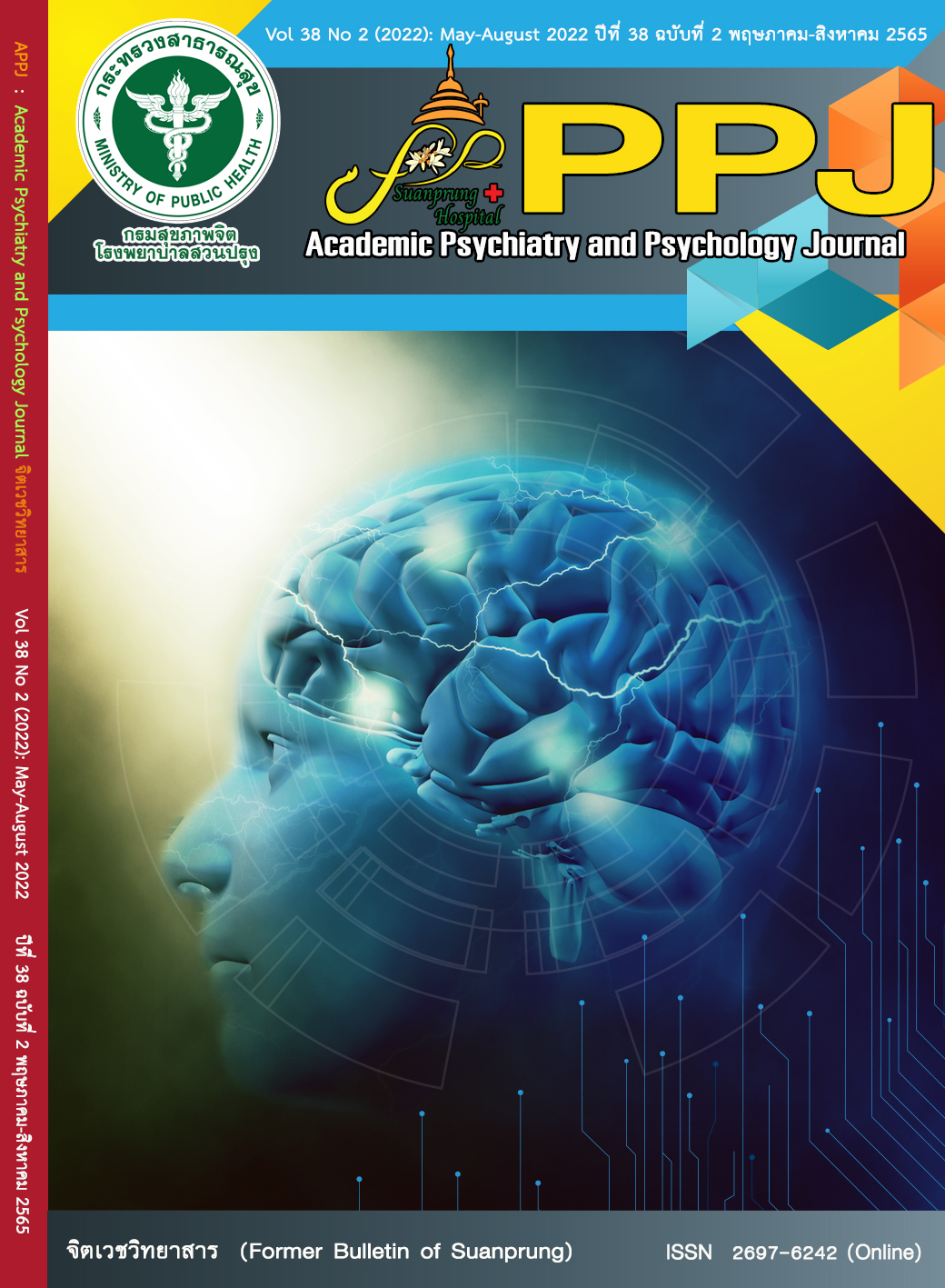Experiences of Online Counselors
Main Article Content
Abstract
Objective: This qualitative research proposed to study the experiences of counselors through online counseling.
Method: This research used Interpretative Phenomenological Analysis (IPA). Key informants were 4 counselors with more than 2,000 hours of counseling and online counseling experiences. Data were collected via semi-structured in-depth interviews between February to April 2022.
Results: Data analysis resulted in 3 themes (1) Attitude toward online counseling showed that counselors compared between online and in-person counseling and have different levels of acceptance. (2) The online counseling process emphasized mental adjustment, preparation of physical space, and preparation of virtual space. (3) The process of dealing with obstacles included the recognition of barriers to online counseling services, and coping with problems arising in online counseling.
Conclusion: Key informants perceived their experience of providing online counseling by comparing it with the in-person model as well as considering its benefits and limitations. Perceptions resulted in various degrees of acceptance, including a positive attitude by wanting to use online counseling in the future, an accepting attitude by considering it as an alternative, and a negative attitude by viewing it as a necessary choice.
Article Details

This work is licensed under a Creative Commons Attribution-NonCommercial-NoDerivatives 4.0 International License.
บทความหลังผ่านการปรับแก้จากกองบรรณาธิการแล้ว เป็นลิขสิทธ์ของวารสารจิตเวชวิทยาสาร โรงพยาบาลสวนปรุง กรมสุขภาพจิต กระทรวงสาธารณสุข ห้ามเผยแพร่เพื่อประโยชน์ทางการค้าโดยไม่ได้รับอนุญาต แต่อนุญาตให้เผยแพร่บทความดังกล่าวเพื่อประโยชน์ทางการศึกษาแก่ประชาชนทั่วไป ทั้งนี้กองบรรณาธิการไม่จำเป็นต้องเห็นด้วยกับบทความหรือข้อคิดเห็นใดๆ ที่ปรากฏในวารสารสวนปรุง
References
Glueckauf RL, Maheu MM, Drude KP, Wells BA, Wang Y, Gustafson DJ, et al. Survey of psychologists’ telebehavioral health practices: technology use, ethical issues, and training needs. Prof Psychol Res Pr 2018;49(3):205-19. doi: 10.1037/pro0000188.
Connolly SL, Miller CJ, Lindsay JA, Bauer MS. A systematic review of providers’ attitudes toward telemental health via videoconferencing. Clin Psychol Sci Pract 2020;27(2):e12311. doi: 10.1111/cpsp.12311.
Poletti B, Tagini S, Brugnera A, Parolin L, Pievani L, Ferrucci R, et al. Telepsychotherapy: a leaflet for psychotherapists in the age of COVID-19. A review of the evidence. Couns Psychol Q 2020;34(3-4):352-67. doi: 10.1080/09515070.2020.1769557.
Simpson S, Richardson L, Pietrabissa G, Castelnuovo G, Reid C. Videotherapy and therapeutic alliance in the age of COVID-19. Clin Psychol Psychother. 2021 Mar;28(2):409-21. PMID: 33037682.
Backhaus A, Agha Z, Maglione ML, Repp A, Ross B, Zuest D, et al. Videoconferencing psychotherapy: a systematic review. Psychol Serv. 2012 May;9(2):111-31. PMID: 22662727.
Norwood C, Moghaddam NG, Malins S, Sabin‐Farrell R. Working alliance and outcome effectiveness in videoconferencing psychotherapy: a systematic review and noninferiority meta-analysis. Clin Psychol Psychother. 2018 Nov;25(6):797-808. PMID: 30014606.
Rees CS, Stone S. Therapeutic alliance in face-to-face versus videoconferenced psychotherapy. Prof Psychol Res Pr 2005;36(6):649-53. doi: 10.1037/0735-7028.36.6.649.
Norcross JC, Lambert MJ, editors. Psychotherapy relationships that work: evidence-based therapist contributions. vols 1. 3rd ed. New York, NY: Oxford University Press; 2019.
Wampold BE, Brown GS. Estimating variability in outcomes attributable to therapists: a naturalistic study of outcomes in managed care. J Consult Clin Psychol. 2005 Oct;73(5):914-23. PMID: 16287391.
Pierce BS, Perrin PB, McDonald SD. Path analytic modeling of psychologists' openness to performing clinical work with telepsychology: a national study. J Clin Psychol. 2020 Jun;76(6):1135-50. PMID: 31468536.
Smith JA. Evaluating the contribution of interpretative phenomenological analysis. Health Psychol Rev 2011;5(1):9-27. doi: 10.1080/17437199.2010.510659.
Chester A, Glass CA. Online counselling: a descriptive analysis of therapy services on the internet. Br J Guid Counc 2006;34(2):145-60. doi: 10.1080/03069880600583170.
Barak A, Klein B, Proudfoot JG. Defining internet-supported therapeutic interventions. Ann Behav Med. 2009 Aug;38(1):4-17. PMID: 19787305.
Suler JR. Cybertherapeutic theory and techniques. In: Barak A, editor. Psychological aspects of cyberspace: theory, research, applications. Cambridge, UK: Cambridge University Press; 2008. p.102-28.
Suler JR. Psychotherapy in cyberspace: a 5-dimensional model of online and computer-mediated psychotherapy. Cyberpsychol Behav 2000;3(2):151-9. doi: 10.1089/109493100315996.
Fussell SR. Social and cognitive processes in interpersonal communication: implications for advanced telecommunications technologies. Hum Factors. 1995 Jun;37(2):228-50. PMID: 7642182.
Kirkwood KT. Validity of cognitive assessments via telecommunication links [dissertation]. Edinburgh, UK: The University of Edinburgh; 1998.
Rønnestad MH, Orlinsky DE, Wiseman H. Professional development and personal therapy. In: Norcross JC, VandenBos GR, Freedheim DK, Campbell LF, editors. APA handbook of clinical psychology: education and profession. Washington, DC: American Psychological Association; 2016. p.223-35.

